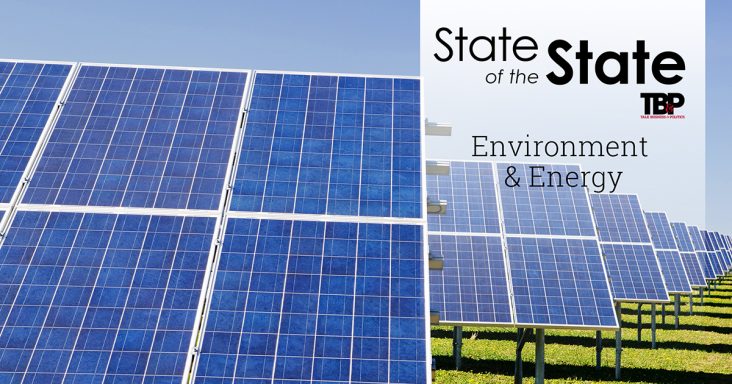State of the State Mid-Year 2024: Arkansas’ energy sector poised for growth
by August 22, 2024 4:58 pm 394 views

Arkansas might be in a unique position to become a power player in the energy sector as more people buy electrical vehicles (EVs) in the coming years. EVs need batteries and lithium is needed to make those batteries.
An effort is underway to develop a lithium mining industry in the state and it could lead to an energy boon in the Natural State, Gifford Briggs, Gulf Coast region director for the American Petroleum Institute, told Talk Business & Politics.
“I think Arkansas is quickly getting into position to be a leader in lithium extraction. … It’s exciting,” he said.
Arkansas sits atop the Smackover Formation, a collection of saltwater brine 8,000 feet below the earth’s surface that stretches from Texas to the Florida panhandle. Rich lithium deposits are found in the formation. The light metal can be extracted in Arkansas using the direct lithium extraction method, a cleaner and easier process than traditional methods, making the brine an ideal source. Arkansas is the only one of those states that has a developed bromine mining industry, meaning an infrastructure is already in place.
Arkansas Advanced Energy Foundation Executive Director Lauren Waldrip said industry leaders in Arkansas need to be formulating plans to replace electric generation that will be lost when two coal fired power plants – White Bluff and Independence – are shuttered by the end of the decade. Replacing the generation is only part of the problem, she said. Energy storage capacity needs to be expanded, demand response programs need to be initiated and other steps need to be taken to ensure the state can provide plentiful and inexpensive electricity for consumers and businesses.
“We obviously want reliable and affordable power,” she said. “It’s for jobs. It’s good for business. It’s good for Arkansas.”
Another issue on the national and state level is the development of the green, or advanced energy, workforce, she said. From 2021 to 2022 the number of workers in this sub-sector grew by 4.5% in Arkansas and grew at a 3.9% clip nationally. Efforts are underway to develop training and apprenticeship programs in this sector, and training standards have to be set on all levels for these specialty industry jobs, she added.
The Midcontinent Independent System Operator (MISO), the largest U.S. regional electricity transmission operator, has more projects going on in Arkansas in the advanced energy space than in any other state right now, Waldrip said. The Natural State has a surplus of flat, affordable agriculture land that is ideal for MISO operations, she said. What that means is the influx of workers in this space is only going to expand, she added.
“It’s a good place for them to do business,” she said.
Her organization has been working with Arkansas communities to secure federal funding for local infrastructure upgrades. The federal Inflation Reduction Act can provide financial resources that many communities can’t afford, she said.
Another issue that has to be addressed is transmission line congestion. When transmission lines get bogged down it costs consumers money and it needs to be improved, she said.
Even as the advanced energy sector continues to grow, Briggs said fossil fuel consumption has not slowed and, and is projected to grow in the coming years. Artificial Intelligence data centers are prompting the potential surge, he added.
“From a broad level when we look at oil and natural gas, we expect continued growth for our products going into the future,” he said. “Demand for energy as a whole is good for the industry. … Some of the numbers are shocking.”
On the consumer level, the price of energy can vary based on the state, he said. Arkansas has embraced multiple forms of energy use such as fossil fuels, solar, wind, nuclear, and others. Access to multiple forms of energy typically leads to lower and more stable prices, he said. Some states like California are attempting to end fossil fuel consumption, but it creates problems, he said. There are many AI data centers that are or will be located in the state and the energy to run them has to come from somewhere, he said.
“Where is that energy going to come from if you end fossil fuel consumption?” he asked.
Editor’s note: The State of the State series provides reports twice a year on Arkansas’ key economic sectors. The series publishes stories to begin a year and around mid-year to provide an update on the state’s economy. Link here for the State of the State page and previous stories.
